Overview
Commercial demolition can be a pretty straightforward task and doesn’t have to take a lot of time. However, the most important thing is to understand what you are doing and the magnitude of the project.
- Large Square-Footage
- Demolition and Debris Removal
- Commercial Grade Demolition
- Demolition Logistics Planning
- Drywall Removal
- Flooring Removal
- Asbestos Removal
- Surface Leveling
- Small Buildings
- Manufacturing Facilities
- Schools
Steps To Commercial Demolition
Our demolition process begins upon our initial free consultation were we identify the scope and scale of the project by addressing the requested style or look, and budget. Our demolition experts will qualify your project through notes, measurements, and pictures. After that our computer assisted demolition software will assist us in determining the best methods of demolition in order to prevent harm to your foundation. Our skilled professionals will walk you through each and every step of the demolition process. Viewing each and every area of the building that needs to be destroyed. This ensures you walk away with a complete understanding of what is in store for the project. No surprises. A licensed and insured representative will follow shortly after to start and complete your demolition in a timely manner. We understand any demolition inside or outside of your property are hindrances to you and your neighbors. Our respectful and clean landscape and debris removal team will not leave until the property is restored to the manor we found it in or better.
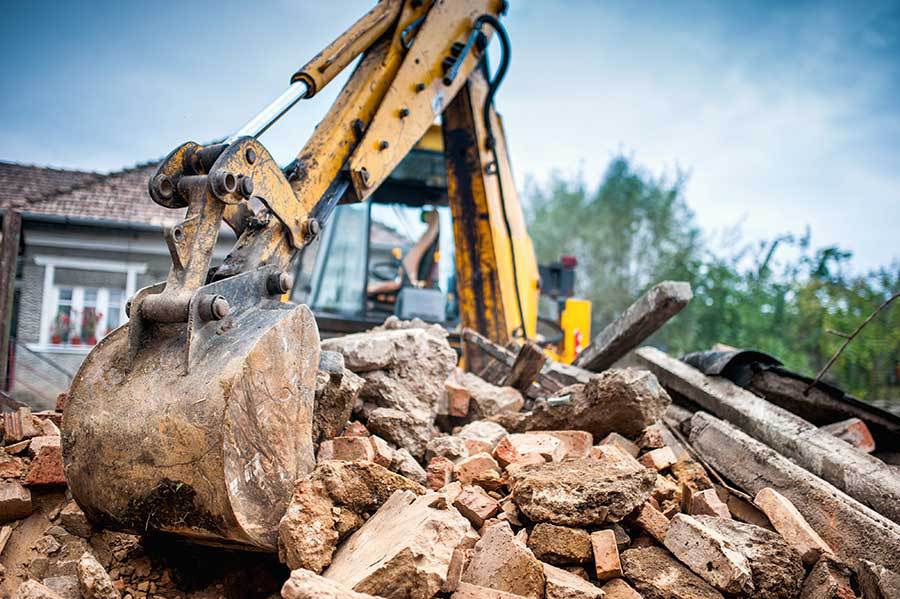
1. Get the right contractor
The first step in the commercial demolition process is to find a licensed and insured contractor to assist you with your project. Your potential candidates can also meet at the site to discuss possible solutions with you.
2. Inspection
In most states, older commercial buildings have to be inspected prior to demolition to determine if there are any signs of:
- Lead paint
- Asbestos
- Rotten wood
- Mold
- Other hazardous materials
3. Get the relevant permits
You will typically need a permit before you can demolish your commercial building or business. In most cases, you can obtain the permit from your local authority offices or on their website if they provide for such measures. You may also have to adhere to rules related to notifications, noise, hours of demolition, or disposal of debris set by City Hall.
4. Disconnect any existing services
There are certain utilities and services that must be disconnected prior to demolition, some of which include sewerage, electricity, water, and gas.
5. Make the area safe for others
Other than shutting off the utilities, be sure to ensure that the adjacent walkways and buildings are protected. You can do this by putting up temporary fencing.
6. Make arrangements for salvage
In case you have salvageable materials in the commercial building, you should work with your contractor to recover reusable or recyclable materials. Depending on the situation, you can sell or donate such items.
7. Tear down the commercial building
This process can take several days depending on which deconstruction method you ultimately decide on. In most cases, it involves the use of a hydraulic excavator to tear down the commercial building and to put away debris into a dumpster or truck.
8. Clear all the debris
Once the demolition is over, make sure you clear all the debris to leave the site clean.
The Main Difference Between Demolition and Deconstruction Is Anchored On The Objective
- In demolition, the goal of the project is to simply tear down a structure, building, or property. The objective of deconstruction is also to tear down the structure, however, it has an added goal of salvaging whatever parts, components, or materials can be reused and recycled.
- Other differences include the time frame for project completion and cost of the same.
- Demolition is simply crashing down the building; whereas, deconstruction is reusing and preserving the demolished fragments. It enables you to make use and recycle old materials.
Demolition is actually faster since you don’t have to spend time looking for valuables to salvage. As to cost, taking tax write-off you can get from donating the salvaged valuables, deconstruction is costlier than demolition since you have to extend the project for a longer period of time and you also have to hire more people to choose and removed parts that can be saved.
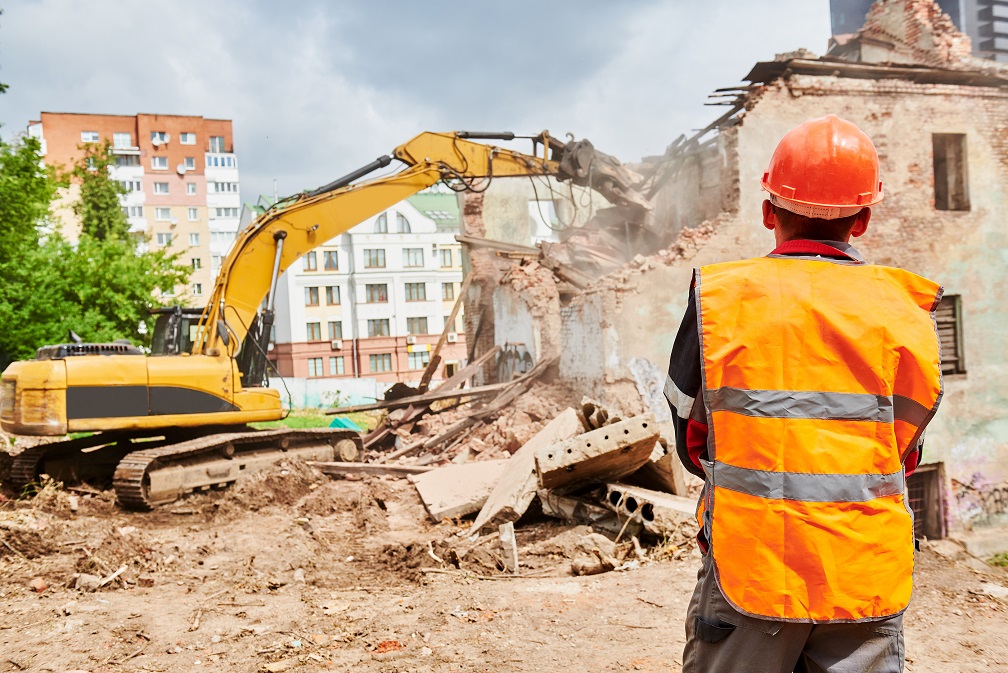
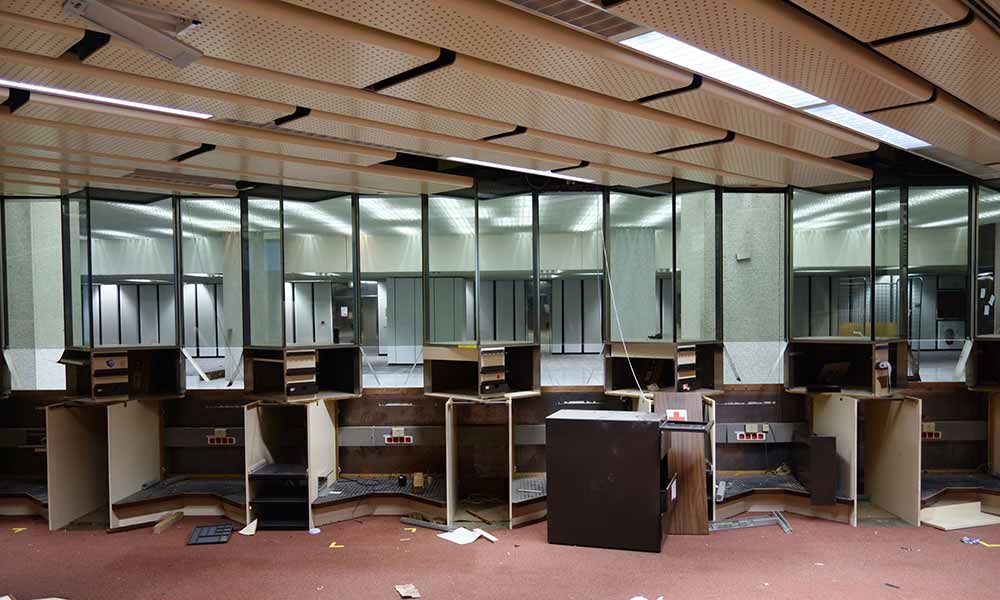
Mechanical Demolition
This is the most common form of demolition—the act of simply tearing down the commercial building with the help of hydraulic excavators and other heavy machinery.
The resulting debris is then hauled away via trailer or dumpster.
Mechanical demolition is the cheapest and fastest solution, costing between $4,000 and $14,000 on average.
Deconstruction
Also known as ‘demolition by hand,” deconstruction is the process of manually stripping and deconstructing the commercial building piece by piece with the intent of salvaging as many of the materials inside the commercial building as possible.
According to the Environmental Protection Agency, deconstruction projects can recycle or reuse more than 70% of building materials, such as lumber, beams, doors, windows and more.
Because everything is done manually, deconstruction takes much longer and costs significantly more than typical demolition methods—sometimes twice as much.
Interior demolition crews individually take off doors, light fixtures, sinks, tubs, copper pipes, glass from windows…even the nails in the floorboards can be removed and recycled.
Because of the additional labor involved, expect to pay 2 to 3 times as much to deconstruct your commercial building rather than demolish it.
Deconstruction + Demolition
The most highly recommended form of demolition is the combination of deconstruction and demolition.
This includes the act of deconstructing the commercial building first by going through and salvaging a portion of the reusable materials.
Once all desired materials capable of being saved and reused are collected, the remaining structure is then demolished, and remaining debris is hauled away.
This is a great solution for those who want their demo process to be efficient, affordable, and environmentally responsible.
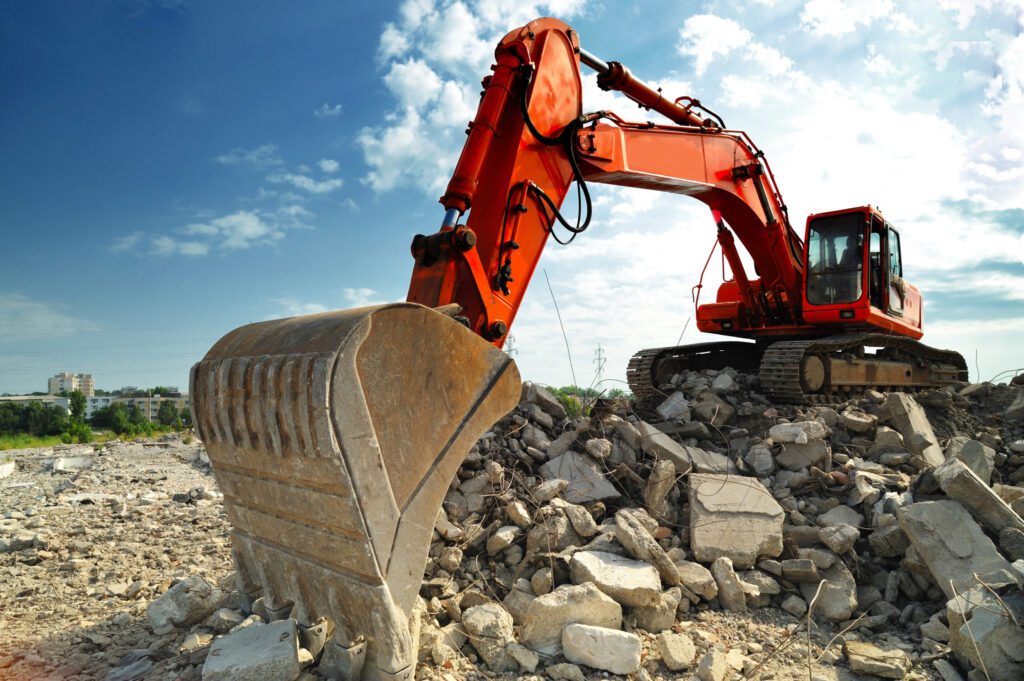
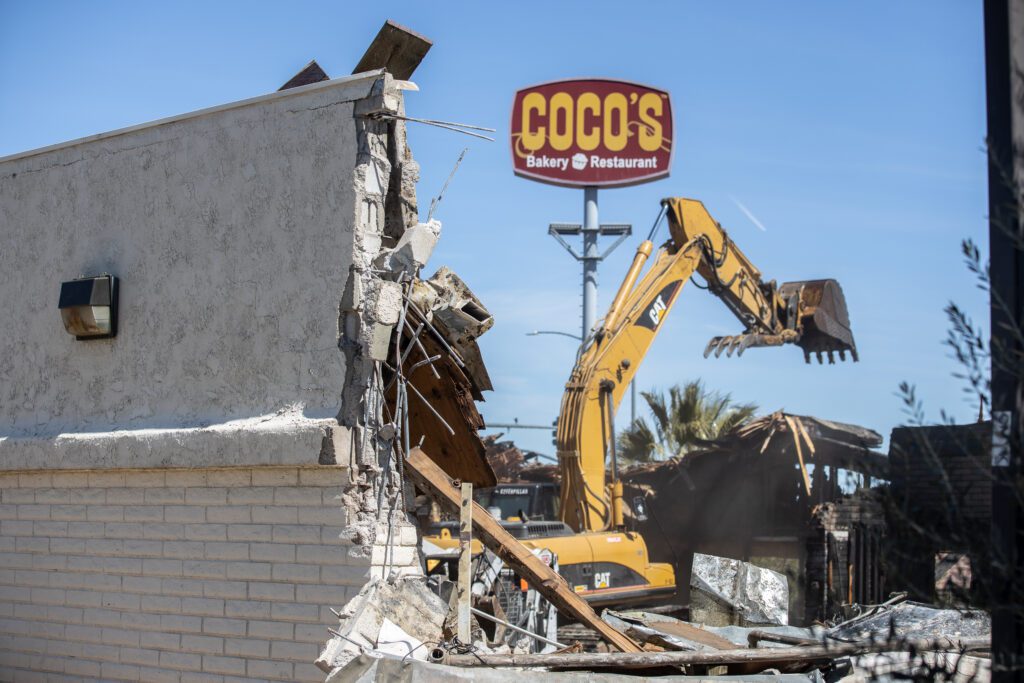
What You’ll Get
Avoid These 6 Red Flags When Hiring a Contractor
There are risks involved when hiring a contractor, so skipping some of the bases and crossing your fingers when hiring a contractor is not an ideal approach.
-
Unable to Verify References
While we would like to think that all contractors are good, honest, straightforward people, that just isn’t always the case. This is why it’s so important to do your research instead of simply hiring a contractor based on face value or his word alone. Don’t be afraid to ask a contractor for a list of references. If they give you an excuse or anything other than references from past projects—and a happy-to-do-it attitude—avoid moving forward with that contractor. Once you have a list of referrals, don’t stop there; reach out to several of them to ask them about their experience.
Don’t just ask general questions, get specific:
- What project did they do for you?
- What was your overall experience like?
- Did they abide by the terms and conditions of the contract?
- Was the project completed to your satisfaction and on time?
- Did they complete the project within the agreed budget?
- Were they easy to communicate with?
- Would you recommend them?
-
A Vague or Non-Existent Contract
One of the biggest and most detrimental mistakes a commercial building owner can make when hiring a contractor is failing to get everything—and we mean everything—hashed out and in writing. It can be easy to lose sight of all your questions (and follow-up questions) once you get on the phone or speak with the contractor in-person. So, make sure to have a running list of details you’ll need to nail down before being able to decide whether or not this is the right contractor for you and your project.
A contract is legally binding and once it’s signed, you’re stuck with it.
At the bare minimum, it should include:
Project Details & Guidelines
- An in-depth description of the project, including the scope of the work, the materials/equipment that will be used, who will be at the job site (working and/or supervising)
- Project start date and estimated date of completion (If your project is on the larger, more complicated side, outline various completion dates for each stage of the project. This will make sure the project stays on track.)
- A protocol for handling any changes that may arise, whether due to new work orders, unforeseen issues, or cancellations
Budget & Payment Schedule
- An estimate and the work/materials that the estimate includes
- A clear-set schedule for payment (Ideally, you will pay a small portion of the overall price upfront, and then you will pay for the work as it is completed.)
You should never sign a contract unless you can confidently say, ‘yes’ to the following questions:
- Did I thoroughly research this company and determine they are qualified to do this work to my expectations?
- Does this contractor clearly understand my vision, budget, and timeline for this project, and is this information explicitly outlined in the contract?
If a contractor hesitates to provide a written contract that meets your standards, avoid hiring that contractor, or at the very least, go back and forth with them until the contract is up to snuff.
-
A Too-Good-To-Be-True Price
We all love a good price. However, unlicensed and unqualified contractors may take advantage of unsuspecting commercial building owner under the guise of a great deal. A little research will reveal that this contractor has bad customer reviews, little to no experience doing the work, or they’re simply not qualified or licensed to do the work.
While a good price is important, it isn’t the end all be all when it comes to hiring a contractor.
Make sure you don’t lose sight of the big picture when shown a low price. The best contractor will offer a balance of skill, experience, and positive customer reviews with reasonable pricing.
-
Asking to pay the full price upfront or in cash
Avoid paying a contractor in cash. If a contractor asks you to pay for the entire project upfront, take a step back (or turn around and run). It’s completely normal to pay for a small percentage of the project before it begins (think 30-50%), but a contractor asking you to pay for any more than half of the project at the start is a cause for concern. By establishing a payment plan in which payments are made as the project is completed, you will avoid the risk of the contractor using your down payment to finance another project, or worse, skip out on the project altogether with your payment in tow.
Likewise, a contractor who insists on receiving all payments in cash could potentially be up to no good.
A reputable business will have no problem accepting multiple forms of payment. For the sake of proof of payment, we always recommend paying with a debit or credit card, check, or money order.
-
No insurance
The importance of insurance cannot be overstated. If your contractor doesn’t have adequate insurance, you could be the one left responsible should a worker be injured or something else goes wrong during the project.
Another way to protect yourself is to obtain a waiver of lien from your contractor and each subcontractor that will be working on your project to ensure that they cannot file a lien against your property.
This will protect you should the contractor fail to pay the subcontractors, who then decide to file a lien on your property, demanding more payment from you.
-
Not licensed
Along the same lines as insurance, a contractor should be properly licensed to perform the work in that state. These licensing laws are designed to protect property owners from negligent or dishonest contractors. Depending on your state’s licensing laws, it could be relatively simple to acquire a contractor’s license. That said, it still acts as a basic indication that your contractor may be qualified to do the work. Different licenses are required for different types of work, so make sure your contractor has the necessary licensing to assist in your project. Also, make sure you understand the difference between a contractor’s bond, license, and insurance.
100% Free Estimate
Do you need Residential or Commercial services completed?
What category of service do you need completed?
Residential
Commercial
Please click the “Request Estimate” button on the service page of the landscaping service you wish to hire Rybak Construction. Once the form is completed you will hear back from us within 2 hours. It takes less than 30 seconds to fill out the 100% Free Estimate form which includes:
- your address of the location you wish the service to be completed
- your phone number
- your email
Residential
Commercial
General Contractor

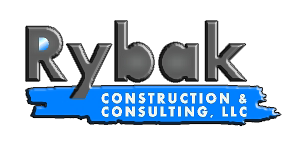
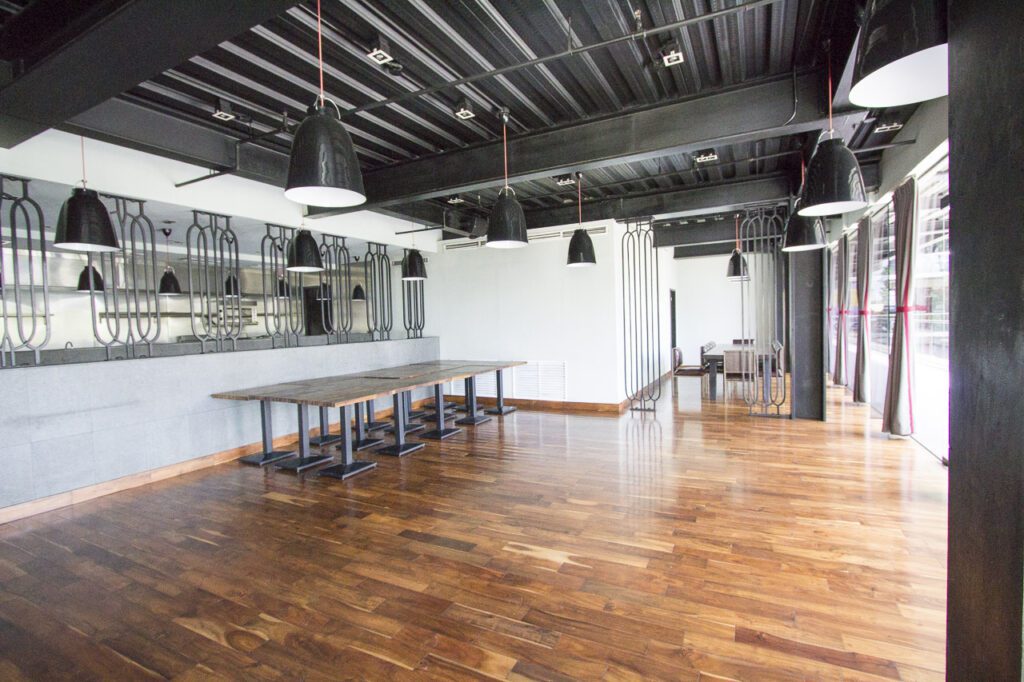
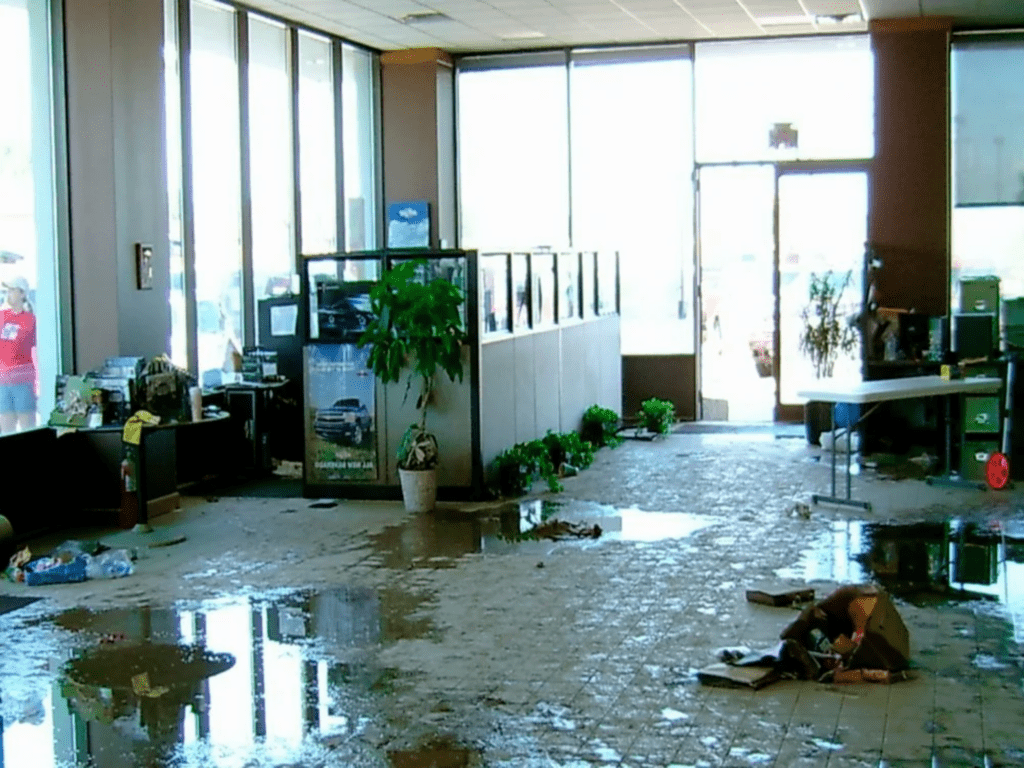
Maria –
Can’t wait to start mixin’ with this one! Irba-irr-Up-up-up-up-date your theme!
Ron Jagov –
Rybak Construction Cape Coral was a great choice for the job. When Hurricane Ian hit Cape Coral, Florida, I, Ron Jagov was faced with the challenge of repairing my home. With much of the area still trying to recover from the storm, finding a reliable contractor was not easy. Luckily, I was able to find Rybak Construction Cape Coral, a company that offered drywall, painting and construction services. I negotiated a contract with them to do some work on his home, agreeing to three payments of over $23,000 each. Not only were they able to provide the necessary services, they were also highly rated in the area, and fast at delivering great demolition results. They also offered minor construction work with 2x4s, something that was needed to repair some of the damage from the hurricane. The work that Rybak Construction Cape Coral did was highly satisfactory. They completed about 100% of the drywall and mudding, and put on at least 2-3 coats of paint. I was very pleased with their work and the quality of their services. I was also very impressed with their professionalism and their responsiveness to my inquiries. Overall, Rybak Construction Cape Coral was an excellent company for painting and construction in Cape Coral FL. I was able to get his home back into shape without having to worry about the quality of the work being done. I am very satisfied with the services Rybak Construction Cape Coral offered and would highly recommend them to anyone in the area who needs painting and construction services.